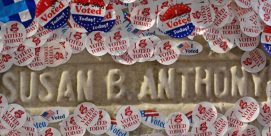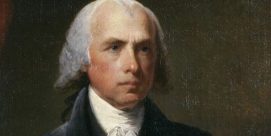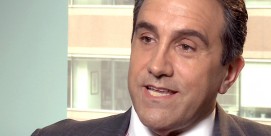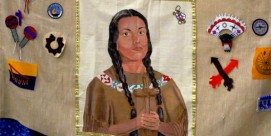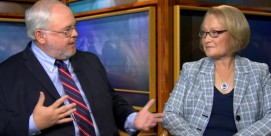In This Episode << SLIDE LEFT TO SEE ADDITIONAL SEGMENTS
Hispanic Voters 2006
BOB ABERNETHY, anchor: Religion continues to be a key factor in American politics, especially during election season, and we will be looking at that over the next several weeks. Today, the vigorous political organizing inside Latino churches. Hispanics are now the largest minority in America. Most Latinos are Democrats, but in recent elections, more and more have voted Republican. However, the debates over immigration reform could change that. Many Hispanics favor more liberal immigration policies than most Republicans have supported. But as Kim Lawton reports, it’s not yet clear how that will affect Hispanic voting.
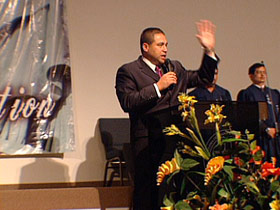
KIM LAWTON: Sunday morning at a Hispanic megachurch in Laredo, Texas. Latino evangelicals are praying for comprehensive immigration reform and for the political clout to make it happen.
UNIDENTIFIED MAN (at prayer rally): If we just pray only and leave this place just doing that, amen, it’s not going to make the greatest difference, because in this country that God has given us, the United States of America, the way to make our voice heard is at the ballot box, amen.
LAWTON: In Chicago, Latino Catholics are also praying for immigration reform, and they’re registering new voters outside the church after Mass. Community leaders say the national debates about immigration are mobilizing Hispanics to get involved politically as never before.
Reverend CLAUDIO DIAZ (Archdiocese of Chicago): They want to be part of that process that somehow will determine their lives and their future. So it’s been like a jolt of energy to really have a group of people, you know, be updated, get informed, be organized.
Professor EDWIN HERNANDEZ (Research Fellow, Center for the Study of Latino Religion, University of Notre Dame): Latinos are a sleeping giant that has been awakened as a result of these discussions, no doubt about that.
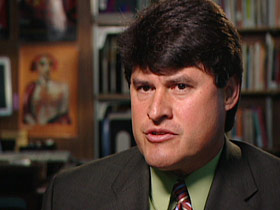
LAWTON: There are more than 42 million Hispanics in America, but most have not been politically active. In 2004, less than half of all eligible Latino voters actually went to the polls. Experts say an energized and still rapidly growing Hispanic voting bloc could have a huge national impact.
Prof. HERNANDEZ: Both political parties are understanding that, are hearing and listening carefully because their political futures, to a large extent, will depend upon how these alignments ultimately are figured out.
LAWTON: Edwin Hernandez is a research fellow at Notre Dame’s Center for the Study of Latino Religion. He says much of the new political activism is centered in Hispanic churches.
Prof. HERNANDEZ: The church is one of those institutions that is owned and operated by the Latino community, and so it is also the place where cultural values are transmitted and preserved and enhanced. The more you participate actively in a particular community of faith, the more you’re likely to absorb and internalize those values and translate that into the public life.
LAWTON: The majority of American Hispanics are Catholic, although evangelical Protestants have been making big inroads. Both Latino Catholic and Protestant churches have framed immigration reform as a moral imperative.
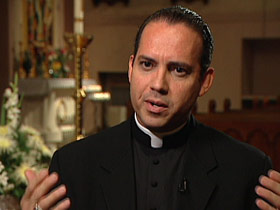
Rev. DIAZ: From the Old Testament we have teachings on, you know, be good to the foreigner, be good to those who are not in your circle. And that teaching has certainly passed to Jesus Christ in the New Testament. The theology is that foreigners are brothers and sisters through the Lord Jesus Christ. That reality cannot be denied and needs to be addressed.
LAWTON: The Catholic Church played a major role in organizing immigration protests in Washington, D.C. and across the country. Now, church leaders are pushing Latino voter registration and education. Father Marco Mercado helped found a group called Priests for Justice for Immigrants.
Reverend MARCO MERCADO (Good Shepherd Catholic Church): We cannot tell people to vote for this party or vote for this guy. But we can tell them you’ve got to go and vote. You’ve got to exercise the right that you have, and this is a moral obligation.
LAWTON: Hispanic Protestants are also mobilizing. In Laredo, Texas, an Assemblies of God Church called Iglesia Cristiana Misericordia is on the frontlines of the immigration battles — literally. It is five miles from the border with Mexico.
Reverend GILBERTO VELEZ (Pastor, Iglesia Cristiana Misericordia): Most of our church is composed of immigrants. Do I have illegal immigrants? I don’t know. I don’t know.
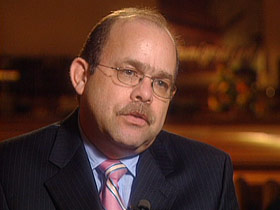
LAWTON: Pastor Gilberto Velez says he doesn’t check the ID cards of the more than 2,000 people who attend his church every Sunday. If he knows they’re illegal, he counsels them to return home. But his church also provides them humanitarian aid. He says his congregation members now realize political decisions often affect their ability to fulfill their mission.
Rev. VELEZ: We’re motivating them and educating them. You know, you want some rights, you need to vote.
LAWTON: In late September, Iglesia Cristiana Misericordia hosted a National Immigration Prayer Rally. The rally was sponsored by a coalition of evangelicals called the National Hispanic Christian Leadership Conference.
Reverend SAMUEL RODRIGUEZ (National Hispanic Christian Leadership Conference, speaking at rally): Immigration reform is not a conservative or a liberal issue. It’s not a Republican or a Democratic issue. We are involved, the church, because we have a spiritual and a Christian obligation to speak up for those that cannot speak up for themselves.
LAWTON: Conference president Samuel Rodriguez is a key leader in the Hispanic faith-based effort to influence public policy. He and other Latino Protestant pastors have partnered with Democratic politicians on immigration reform, but he has also worked with Republican leaders to support traditional marriage.
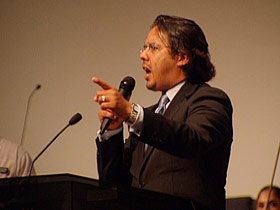
Rev. RODRIGUEZ: Both parties understand the power of the Hispanic voting bloc. The largest minority group in America, 42-43 million Hispanics, become the deal breakers of national elections.
LAWTON: Professor Hernandez says Hispanics don’t fit neatly into political categories.
Prof. HERNANDEZ: Conservative on family values, conservative on issues of abortion. On the other hand, there are issues related to education, housing, the job, the economy and issues that have to do with the bread and butter issues of how can we move up the economic ladder that Latinos align themselves in those other issues in a more progressive, liberal side.
LAWTON: Traditionally, Latinos, like other minority groups, tended to vote more with the Democratic Party. But that’s been changing. In 2004, the largest number ever — 40 percent of Latinos — voted Republican in a presidential election. Analysts credit Latino evangelicals for much of that. Hispanic Protestants are one of the fastest growing segments of the Latino electorate. They make up about one-third of all Hispanic voters, and they gave strong support to George W. Bush in the last presidential election. Fifty-six percent of Latino Protestants voted for Bush in 2004, up from 44 percent in 2000.
Rev. RODRIGUEZ: The honeymoon period is over.
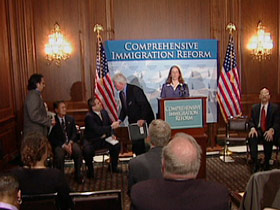
LAWTON: Reverend Rodriguez says many Latino evangelicals are now reconsidering their support for Republicans. He says they were troubled by some of the Republican rhetoric during recent congressional immigration debates and they wonder what the party truly stands for.
Rev. RODRIGUEZ: Is it compassionate conservatism, or is it a xenophobic, sort of anti-immigrant, anti-Latino party? That’s a question that has to be answered. I don’t necessarily see Hispanics jumping the bandwagon and overwhelmingly voting Democratic. I do see them holding back and not participating in the voting, in the electoral process, and not going to the ballot box, waiting, all right. Let’s find out really who speaks on behalf of Republicans in America.
LAWTON: At the same time, Rodriguez argues that many Hispanic Christians are uncomfortable with Democratic support for abortion rights and same-sex marriage.
Rev. RODRIGUEZ: I think the Democratic Party has an opportunity of engaging many Hispanic voters. To do so, they would need to move a lot more towards the middle.
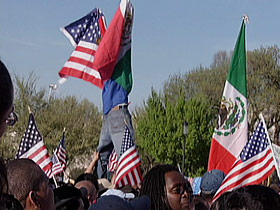
LAWTON: I asked him which issues he thinks Hispanic evangelicals will base their votes on this fall.
Rev. RODRIGUEZ: Immigration is right up there. However, they’re looking at life, they’re looking at the continuity and respect to an institution that has been around since the beginning. You know, if they had to pick one or the other, it’s probably going to be life and marriage over immigration. Not that immigration is not important. It’s going to be a tough call.
Prof. HERNANDEZ: It’s a tough issue to know what would trump the other, and I think only time will tell. But at the very core issue the immigration debate is about who we are, and when you put my family, my grandmother, my children — I’m going to protect them, and I’m going to seek their well being at the expense of any other issue.
LAWTON: However things shake down politically, experts agree the mobilization over immigration is creating unprecedented new alliances between various ethnic groups within the Hispanic world and between Catholics and Protestants.
Rev. DIAZ: I think it will leave a mark, and we’re making history.
Prof. HERNANDEZ: Pentecostal pastors, priests, lay Catholic leaders have come together and joined forces to say we as a community may be divided by faith and other areas, but on this issue we’re coming together, because we need to take a stand about the dignity of who Latinos are.
LAWTON: Those alliances are poised to reshape American politics for generations to come. I’m Kim Lawton in Laredo, Texas.

